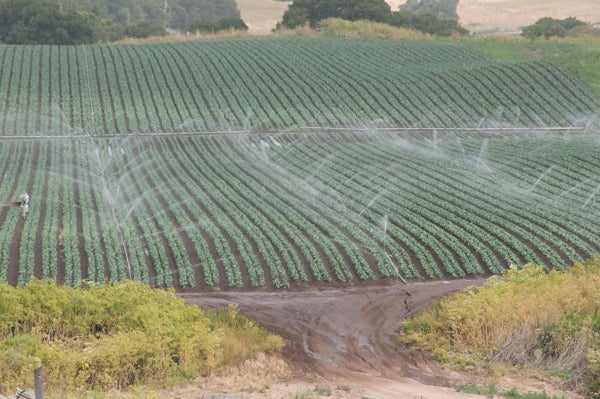Irrigation alleviates hot extremes driven by human-caused climate change
New study finds that irrigation can offset risk of heat extremes regionally
Jan 16, 2020 - by Staff
Jan 16, 2020 - by Staff
Irrigation can offset the increased risk of heat extremes associated with human-caused climate change in intensely irrigated regions, according to a new study led by ETH Zurich, other universities, and the National Center for Atmospheric Research (NCAR).
Scientists have known that large-scale irrigation can significantly affect local climate conditions, especially extremely hot temperatures. How irrigation's influence on climate compares to the effects of global warming, however, has been largely unknown.
In a new study published in Nature Communications, an international team of researchers under the lead of ETH Zurich researcher Sonia Seneviratne examined the influence of irrigation more closely. The scientists used observational data and global climate simulations to isolate the climatic effects of irrigation from the warming induced by other natural and human climatic drivers, predominantly greenhouse gas emissions.
The results consistently highlight a strong irrigation-induced cooling effect during warm extremes in intensely irrigated regions in Southern Europe, North Africa, South Asia, and the United States. The researchers found that over those regions, irrigation reduces the probability of hot days by a similar magnitude as global warming increases their likelihood, leading to little or no overall change.

“In summary, we showed that irrigation expansion has regionally masked the historical warming of hot extremes from anthropogenic greenhouse gas emissions and all other climate drivers combined,” said Seneviratne.
Over South Asia, irrigation locally reduced the likelihood of hot extremes by about 50-88 percent, with particularly strong effects over the Indo-Gangetic Plain.
“The climate that we experience in any particular location is due to many factors including, of course, the natural climate of that region, climate change due to greenhouse gas increases, and direct climate impacts due to human use of the land, especially irrigation,” said NCAR scientist David Lawrence, who worked on the modelling aspects of the study. "This study demonstrates that the cooling effect associated with greater use of irrigation in many agricultural regions has masked the upward trend in heat extremes resulting from anthropogenic greenhouse gas emissions."
The study was supported in part by the European Research Council, the U.S. Department of Energy, the U.S. Department of Agriculture, and the National Science Foundation, which sponsors NCAR.
Although the irrigation-induced cooling is mostly limited to intensely irrigated regions, these are often located in densely populated areas. About one billion people currently benefit from the reduction in hot extremes because irrigation quadrupled in area throughout the 20th century.
However, the researchers say it’s questionable to what extent this benefit will continue into the future. Diminishing groundwater reserves and reduced runoff from retreating glaciers may decrease water supply for irrigation in the long term.
“Besides a possible stagnation or even decrease in the global area being irrigated, agricultural water use may potentially also become more efficient to meet sustainable development goals related to water resources availability, food security, and biodiversity,” said Wim Thiery, who performed this research as a postdoc at the Institute for Atmospheric and Climate Science. He has since moved to the University of Brussels.
In that case the irrigation-induced cooling might level off, leading to accelerated warming across the irrigation hotspots of the world. At the moment, however, this local amplification of warming is still hypothetical; the researchers aim to address this question with their ongoing research.
Title: Warming of hot extremes alleviated by expanding irrigation
Authors: Wim Thiery, Auke J. Visser, Erich M. Fischer, Mathias Hauser, Annette L. Hirsch,
David M. Lawrence, Quentin Lejeune, Edouard L. Davin, and Sonia I. Seneviratne
Journal: Nature Communications, DOI: 10.1038/s41467-019-14075-4